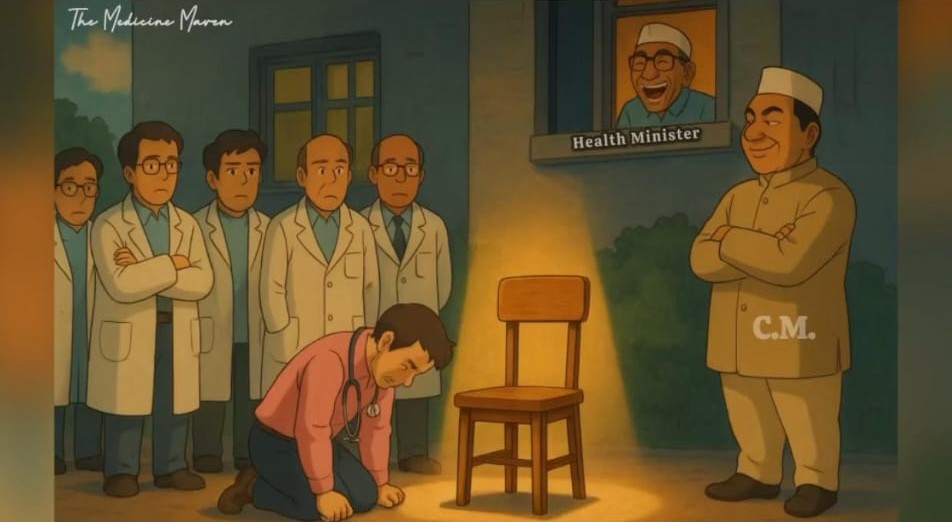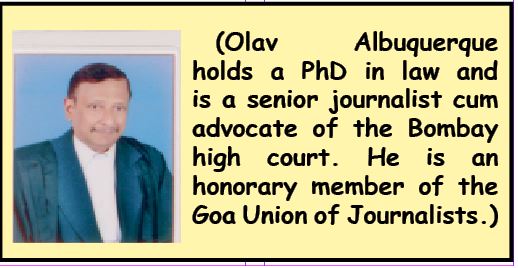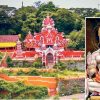Goa is abuzz with excitement as vintage bike and car owners, users, collectors and fans are decking […]

LENSMEN & BREACH OF PRIVILEGE NOTICES! By Olav Albuquerque
July 05- July 11, 2025, LAW July 4, 2025THE recent annual general meeting (AGM) of the Goa Union of Journalists (GUJ) at Margao was a first of its kind, because till date these AGMs were held at Shrama Shakti Bhavan at Patto in Panjim, where the GUJ has its headquarters. The GUJ president, Raj Tilak Naik, who has been elected for the third successive term to head the union, presided over the meeting. He discussed the complaint of health minister, Viswajit Rane, who brought his own camera team to record what took place when he upbraided the chief medical officer of the Goa Medical College and ordered his suspension.
The point is that our photojournalists were lucky not to get themselves into trouble — because they were not present to photograph what took place when the health minister suspended Dr Rudresh Kurtikar, for refusing to give an injection in Casualty to the mother-in-law of a senior journalist.
Dr Kurtikar was later reinstated by Chief Minister Pramod Sawant who ensured the health minister apologized. Casualty is meant for trauma and accident victims and are on the verge of losing their life if quick medical treatment is not given. It is not meant for patients whose lives are not in immediate danger.
RANE THREAT
WHAT took the cake is that Viswajit Rane allegedly threatened to issue breach of privilege motions to the newspapers, which robustly reported the event, which will obviously include the leading English dailies of the state. The point is do we really enjoy unfettered freedom of speech and expression as Article 19 (1) (a) guarantees all of us ? Or is this a mere chimerical freedom, like a beautiful rainbow in the sky which makes us all wax eloquent, but vanishes after sunshine replaces the raindrops which create the beautiful rainbow ?
The Goa legislative assembly had suspended a GUJ member, Mayabhushan Nagvekar who propelled himself to fame or was it notoriety, by exposing racketeers among the journalistic community who disseminated propaganda disguised as news — which the mine owners wanted the Goemakars to know. His blog “Pen Pricks” is still available on the internet.
A former GUJ president, Ashley do Rozario, told the chief minister at the Menezes Braganza hall two years ago how Mayabhushan Nagvekar was suspended after a bottle of Budweizer was detected in his backpack, which he had put through the scanner in the assembly. Mayabhushan Nagvekar, who made too many enemies by exposing the link between mine owners and their front men who masquerade as journalists, was forced to leave the profession and he has now written a novel.
With the exception of “oHeraldo,” the mine owners own 95 per cent of all the media houses in Goa. The mine owners started all the colleges and also the sports clubs like Dempo Sports Club, Salgaocar Sports Club, the erstwhile Sesa Goa Sports Club. The “Gomantak Times” was owned by the Chowgules who were mine owners until the Sakal Group owned by Sharad Pawar’s elder brother, bought the loss making newspaper from the Chowgules.
The first chief minister of Goa, Dayanand Bandodkar, was a mine owner although not as big as the Dempos, the Salgaocars and the Timblos, all of whom are in the big league. Goa’s most prominent law college, the VM Salgaocar Law College was also started by the Salgaocars who are mine owners. There is nothing wrong in this because mining, tourism and agriculture form the backbone of the state as everybody knows.
CASINO SPIN-OFF
THE casinos are a spin off from the tourism industry where Goans are discouraged from squandering away their life savings, but foreign and domestic tourists who have a lot of money to splurge are encouraged to play the roulette wheel or whatever else they choose to gamble upon.
Leaving all that aside, the Goa Legislative Assembly brought out a book in 2003 titled “Privileges Issues and Rulings Thereon” which encapsulates the breach of privilege notices and decisions of the committee set up by the legislative assembly on these cases. Interestingly, most of these cases have ended with an apology from the editor.
Some of these cases concern complaints raised by the MLAs alleging misreporting or factually incorrect reporting, because the records of the debates were not made instantaneously available to the reporters in the assembly.
This book is a gem for all reporters covering the Goa legislative assembly because it enumerates various cases of reporters who aroused the ire of various MLAs and even a former chief minister. The book shows that in most cases, the editors have been allowed to submit their explanations because no intention to commit a breach of privilege or prevent the elected representatives from discharging their duty towards those who elected them.
Leaving all that aside, the Karnataka legislative assembly has passed a bill to curb fake news. The Karnataka Misinformation and Fake News (Prohibition) Bill, 2025 in the name of prohibiting misinformation and fake news, empowers a committee of law makers to identify and label content on social media as “fake news.” Under the guise of preventing so-called fake news, freedom of speech has been curtailed.
For the first time ever, this Bill carries a stiff jail sentence of up to seven years in jail for social media users who are held guilty of posting fake news. But what is “fake news”? This is to be decided by a committee headed by the state information and broadcasting minister who will set up special courts to deal with such cases.
FAKE NEWS?
THE so called fake news encapsulates any comments which are deemed to be anti-feminism, whatever that might mean, or which is “disrespectful of “Sanatan symbols” without precisely defining or enumerating what exactly are these symbols. Does the lotus constitute a Sanatan symbol ? The lotus is associated with a political party and although seen in images as being associated with the revered Goddess Saraswati, is too widely used to link it with only the Sanatan Dharma. It may also be used by Buddhism which is widely practiced throughout India.
Finally, the Goa government will not pass a law to protect journalists from being attacked while discharging their official duties. Photographers are often attacked while using their cameras during riots or other demonstrations, which is why this law was the need of the hour. But like Karnataka which has cracked down on so-called fake news, which may be innocent comments exploited by politicians to rouse the sentiments of their vote banks, Goa too may follow suit if we do not guard against such evils.
For freedom of speech and expression is a chimera like a beautiful rainbow in the sky. This freedom is used and abused by most politicians while suppressing the right of the media to expose their shenanigans in land deals and casino contracts.















